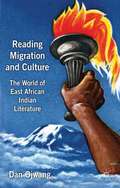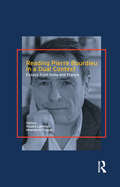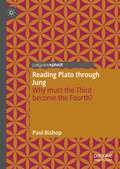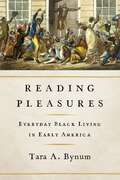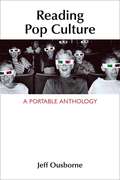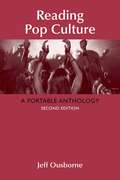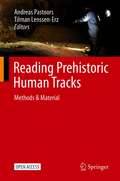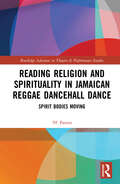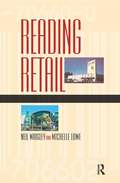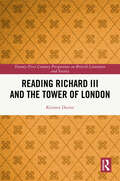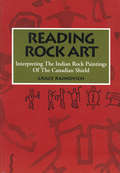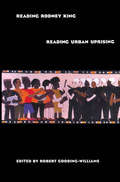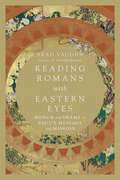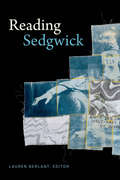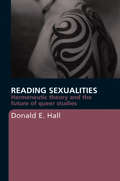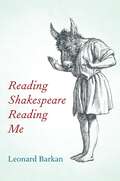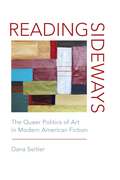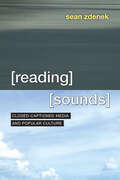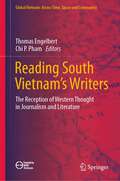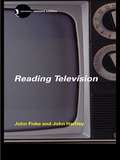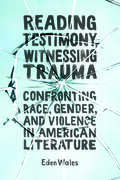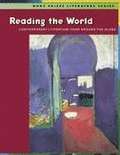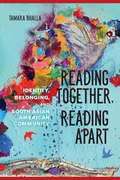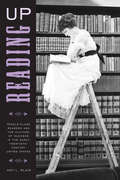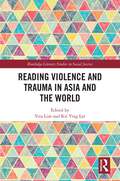- Table View
- List View
Reading Migration and Culture
by Dan OjwangThis book uses the uniquely positioned culture of East African Asians to reflect upon the most vexing issues in postcolonial literary studies today. By examining the local histories and discourses that underpin East African Asian literature, it opens up and reflects upon issues of alienation, modernity, migration, diaspora, memory and nationalism.
Reading Pierre Bourdieu in a Dual Context: Essays from India and France
by Roland Lardinois1. The Crises of Imperial Societies Christophe Charle 2. Thinking the State with Bourdieu and Foucault U. Kalpagam 3. Bourdieu’s Theory of the Symbolic: Traditions and Innovations Sheena Jain 4. The Field of Indian Knowledge in France in the 1930s Roland Lardinois 5. Literature and Politics During the German Occupation Gisele Sapiro 6. Symbolic Violence and Masculine dominance in the Vichy Regime Francine Muel-Dreyfus 7. Habitus, Performance and Women’s Experience in Everyday Life Meenakshi Thapan 8. Pierre Bourdieu and Anthropology Alban Bensa 9. Documents and Testimony: Violence in the Bombay Riots Deepak Mehta Index
Reading Plato through Jung: Why must the Third become the Fourth?
by Paul BishopThis book examines the Jungian imperative that the Third must become the Fourth through the lens of Carl Jung’s complex reception of Plato. While in psychoanalytic discourse the Third is typically viewed as an agent that brings about healing, the author highlights that, in the case of Jung, an early emphasis on the Third as the “transcendent function” gave way to an increasing insistence on the importance of the Fourth. And yet, he asks, why must “the Third become the Fourth”? Paul Bishop begins with a survey of work on Jung’s relation to Plato, before turning to Jung’s readings of the Timaeus and Black Books, as well as Goethe’s Faust II and Nietzsche’s Zarathustra. He proceeds to unpick Jung’s statements on the Third and the Fourth though a compelling analysis of how Jung draws upon religious and alchemical traditions, Pythagorean numerology, his own dream-like experiences and Plato’s cosmology. This book will appeal to practitioners and to scholars working in the history of ideas, psychoanalysis, philosophy, and psychoanalytic theory.
Reading Pleasures: Everyday Black Living in Early America (New Black Studies Series)
by Tara A. BynumIn the early United States, a Black person committed an act of resistance simply by reading and writing. Yet we overlook that these activities also brought pleasure. Tara A. Bynum tells the compelling stories of four early American writers who expressed feeling good despite living while enslaved or only nominally free. The poet Phillis Wheatley delights in writing letters to a friend. Ministers John Marrant and James Albert Ukawsaw Gronniosaw memorialize their love for God. David Walker’s pamphlets ask Black Americans to claim their victory over slavery. Together, their writings reflect the joyous, if messy, humanity inside each of them. This proof of a thriving interior self in pursuit of good feeling forces us to reckon with the fact that Black lives do matter. A daring assertion of Black people’s humanity, Reading Pleasures reveals how four Black writers experienced positive feelings and analyzes the ways these emotions served creative, political, and racialized ends.
Reading Pop Culture: A Portable Anthology
by Jeffrey OusborneReading Pop Culture: A Portable Anthology is a current, compact, inexpensive collection that taps into students' passionate engagement with popular culture in order to help them to become better writers. Its focus on themes of consumption, advertising, identity, technology, television, movies, and new media prompts composition students to think and write about issues they care about. This volume in the popular Bedford/St. Martin's series of Portable Anthologies and Guides offers a trademark combination of high quality and great value.
Reading Pop Culture: A Portable Anthology (Second Edition)
by Jeff OusborneReading Pop Culture: A Portable Anthology, Second Edition, taps into students' interest in pop culture while addressing their need for instruction in critical analysis. <P><P>It combines currency, quality, brevity, and value in a collection of essays and images for first-year or themed writing courses. It presents a variety of voices in terms of gender, sexuality, race, and culture, as well as in topics and time periods. <P><P>It also features more variety of reading selections, including academic essays from scholars and articles published in popular media outlets from emerging writers.
Reading Prehistoric Human Tracks: Methods & Material
by Andreas Pastoors Tilman Lenssen-ErzThis Open Access book explains that after long periods of prehistoric research in which the importance of the archaeological as well as the natural context of rock art has been constantly underestimated, research has now begun to take this context into focus for documentation, analysis, interpretation and understanding. Human footprints are prominent among the long-time under-researched features of the context in caves with rock art. In order to compensate for this neglect an innovative research program has been established several years ago that focuses on the merging of indigenous knowledge and western archaeological science for the benefit of both sides.The book gathers first the methodological diversity in the analysis of human tracks. Here major representatives of anthropological, statistical and traditional approaches feature the multi-layered methods available for the analysis of human tracks. Second it compiles case studies from around the globe of prehistoric human tracks. For the first time, the most important sites which have been found worldwide are published in a single publication. The third focus of this book is on firsthand experiences of researchers with indigenous tracking experts from around the globe, expounding on how archaeological sciencecan benefit from the ancestral knowledge. This book will be of interest to professional archaeologists, graduate students, ecologists, cultural anthropologists and laypeople, especially those focussing on hunting-gathering and pastoralist communities and who appreciate indigenous knowledge.
Reading Religion and Spirituality in Jamaican Reggae Dancehall Dance: Spirit Bodies Moving (Routledge Advances in Theatre & Performance Studies)
by 'H' PattenThis book explores the genealogy of Jamaican dancehall while questioning whether dancehall has a spiritual underscoring, foregrounding dance, and cultural expression. This study identifies the performance and performative (behavioural actions) that may be considered as representing spiritual ritual practices within the reggae/dancehall dance phenomenon. It does so by juxtaposing reggae/dancehall against Jamaican African/neo-African spiritual practices such as Jonkonnu masquerade, Revivalism and Kumina, alongside Christianity and post-modern holistic spiritual approaches. This book will be of great interest to students and scholars in performance studies, popular culture, music, theology, cultural studies, Jamaican/Caribbean culture, and dance specialists.
Reading Retail: A Geographical Perspective on Retailing and Consumption Spaces (Reading Economic Geography Ser.)
by Neil Wrigley Michelle LoweReading Retail captures contemporary debates on the geography of retailing and consumption spaces. It is constructed around a series of 'readings' from key works, and is designed to encourage readers to develop a sense of engagement with the rapidly evolving debates in this field. More than 60 edited readings are integrated into the text, providing a guided route map through the literature and into the study of the geographies of retailing and consumption. The volume also introduces readers to the exciting and interdisciplinary developments unfolding in the 'new retail geography', drawing on up-to-the-minute research material from areas ranging from anthropology to business studies, and tackling issues as diverse as retail internationalization and e-commerce.Reading Retail is unique in bringing together a huge range of perspectives on retailing and consumption spaces and will provide a key source text for students in this field.
Reading Richard III and the Tower of London (21st Century Perspectives on British Literature and Society)
by Kristen DeiterThis is the first book on Richard III and the Tower of London, shedding new light on the King’s reputation, the Castle’s lore, and early modern literature’s role in building associations between them. It is also one of the first books to integrate conceptual blending theory and spatial literary studies, empowering scholars and students to analyze literature and locations in new ways. This book fills gaps in the existing knowledge about both Richard III and the Tower of London. Neither literary nor historical scholarship has treated the process through which Richard III and the Tower became associated in the cultural and historical imagination and how such representations have shaped the King’s reputation and the Castle’s lore. This study analyzes this process while offering new understandings of Richard III as a literary character in prose, drama, and poetry and extending knowledge about the Tower as an iconic literary and cultural symbol.
Reading Rock Art: Interpreting the Indian Rock Paintings of the Canadian Shield
by Grace Rajnovich Wayne YerxaMore than 400 rock paintings adorn the Canadian Shield from Quebec, across Ontario and as far west as Saskatchewan. The pictographs are the legacy of the Algonkian-speaking Cree and Ojibway, whose roots may extend to the beginnings of human occupancy in the region almost 10,000 years ago. Archaeologist Grace Rajnovich spent fourteen years of field research uncovering a multitude of clues as to the meanings of the paintings. She has written a text which is unique in its ability to "see" the paintings from a traditional native viewpoint. Skilfully weaving the imagery, metaphors and traditions of the Cree and Ojibway, the author has recaptured the poetry and wisdom of an ancient culture. Chief Willie Wilson of the Rainy River Band considers Grace’s work "innovative and original."
Reading Rodney King/Reading Urban Uprising
by Robert Gooding-WilliamsReading Rodney King/Reading Urban Uprising keeps the public debate alive by exploring the connections between the Rodney King incidents and the ordinary workings of cultural, political, and economic power in contemporary America. Its recurrent theme is the continuing, complicated significance of race in American society. Contributors: Houston A. Baker, Jr.; Judith Butler; Sumi K. Cho; Kimberle Crenshaw; Mike Davis; Thomas L. Dumm; Walter C. Farrell, Jr.; Henry Louis Gates, Jr.; Ruth Wilson Gilmore; Robert Gooding-Williams; James H. Johnson, Jr.; Elaine H. Kim; Melvin L. Oliver; Michael Omi; Gary Peller; Cedric J. Robinson; Jerry Watts; Cornel West; Patricia Williams; Rhonda M. Williams; Howard Winant.
Reading Romans with Eastern Eyes: Honor and Shame in Paul's Message and Mission
by Jackson W.What does it mean to “read Romans with Eastern eyes”? Combining research from Asian scholars with his many years of experience living and working in East Asia, Jackson directs our attention to Paul's letter to the Romans. He argues that some traditional East Asian cultural values are closer to those of the first-century biblical world than common Western cultural values. In addition, he adds his voice to the scholarship engaging the values of honor and shame in particular and their influence on biblical interpretation. As readers, we bring our own cultural fluencies and values to the text. Our biases and background influence what we observe—and what we overlook. This book helps us consider ways we sometimes miss valuable insights because of widespread cultural blind spots. In Reading Romans with Eastern Eyes, Jackson demonstrates how paying attention to East Asian culture provides a helpful lens for interpreting Paul's most complex letter. When read this way, we see how honor and shame shape so much of Paul's message and mission.
Reading Sedgwick (Theory Q)
by Lauren BerlantOver the course of her long career, Eve Kosofsky Sedgwick became one of the most important voices in queer theory, and her calls for reparative criticism and reading practices grounded in affect and performance have transformed understandings of affect, intimacy, politics, and identity. With marked tenderness, the contributors to Reading Sedgwick reflect on Sedgwick's many critical inventions, from her elucidation of poetry's close relation to criticism and development of new versions of queer performativity to highlighting the power of writing to engender new forms of life. As the essays in Reading Sedgwick demonstrate, Sedgwick's work is not only an ongoing vital force in queer theory and affect theory; it can help us build a more positive world in the midst of the bleak contemporary moment. Contributors. Lauren Berlant, Kathryn Bond Stockton, Judith Butler, Lee Edelman, Jason Edwards, Ramzi Fawaz, Denis Flannery, Jane Gallop, Jonathan Goldberg, Meridith Kruse, Michael Moon, José Esteban Muñoz, Chris Nealon, Andrew Parker, H. A. Sedgwick, Karin Sellberg, Michael D. Snediker, Melissa Solomon, Robyn Wiegman
Reading Sexualities: Hermeneutic Theory and the Future of Queer Studies
by Donald E. HallReading Sexualities confronts the reigning practices, priorities, and preoccupations of queer theory and sexuality studies. Looking at a range of texts, from novels to travel narratives to internet porn, Donald E. Hall deftly weaves the theoretical with the literary in order to: examine the vexed ethical, critical, and political questions arising from sexual consumerism and cross-cultural encounters read the changing landscape of sexual identity, finding great cause for optimism and enthusiastic engagement urge readers to embrace a far-reaching dialogic practice as a mechanism for furthering radical social change. Reading Sexualities shows how our sexual desires and bases for identification are being widely challenged and changed. Drawing on hermeneutic theory and the work of Hans-Georg Gadamer, Hall argues that by approaching sexual diversity with openness and humility, we become active participants in the politically urgent process of reading the self through the perspective of the other.
Reading Shakespeare Reading Me
by Leonard BarkanA gripping, funny, joyful account of how the books you read shape your own life in surprising and profound ways.Bookworms know what scholars of literature are trained to forget: that when they devour a work of literary fiction, whatever else they may be doing, they are reading about themselves. Read Shakespeare, and you become Cleopatra, Hamlet, or Bottom. Or at the very least, you experience the plays as if you are in a small room alone with them, and they are speaking to your life, your sensibility.Drawing on fifty years as a Shakespearean, Leonard Barkan has produced a captivating book that asks us to reconsider what it means to read. Barkan violates the rule of distance he was taught and has always taught his students. He asks: Where does this brilliantly contrived fiction actually touch me? Where is Shakespeare in effect telling the story of my life?King Lear, for Barkan, raises unanswerable questions about what exactly a father does after planting the seed. Mothers from Gertrude to Lady Macbeth are reconsidered in the light of the author’s experience as a son of a former flapper. The sonnets and comedies are seen through the eyes of a gay man who nevertheless weeps with joy when all the heterosexual couples are united at the end. A Midsummer Night’s Dream is interpreted through the author’s joyous experience of performing the role of Bottom and finding his aesthetic faith in the pantheon of antiquity. And the exquisitely poetical history play Richard II intersects with, of all things, Ru Paul’s Drag Race.Full of engrossing stories, from family secrets to the world of the theater, and written with humor and genuine excitement about literary experiences worthy of our attention and our love, Reading Shakespeare Reading Me makes Shakespeare’s plays come alive in new ways.
Reading Sideways: The Queer Politics of Art in Modern American Fiction
by Dana SeitlerReading Sideways explores the pivotal role that various art forms played in American literary fiction in direct relation to the politics of gender and sexuality in works of modern American literature. It tracks the crosswise circulation of aesthetic ideas in fiction and argues that at stake in the aesthetic turn of these works was not only the theorization of aesthetic experience but also an engagement with political arguments and debates about available modes of sociability and sexual expression. To track these engagements, its author, Dana Seitler, performs a method she calls “lateral reading,” a mode of interpretation that moves horizontally through various historical entanglements and across the fields of the arts to make sense of—and see in a new light—their connections, challenges, and productive frictions. Each chapter takes a different art form as its object: sculpture, portraiture, homecraft, and opera. These art forms appear in some of the major works of literature of the period central to negotiations of gender, race, and sexuality, including those by Henry James, Davis, Willa Cather, Du Bois, Sarah Orne Jewett, and Mary Wilkins Freeman. But the literary texts that each chapter of this book takes as its motivation not only include a specific art form or object as central to its politics, they also build an alternative aesthetic vocabulary through which they seek to alter, challenge, or participate in the making of social and sexual life. By cultivating a counter-aesthetics of the unfinished, the uncertain, the small, the low, and the allusive, these fictions recognize other ways of knowing and being than those oriented toward reductively gendered accounts of beauty, classed imperatives established by the norms of taste, or apolitical treatises of sexual disinterestedness. And within them—and through “reading sideways”—we can witness the coming-into-legibility of a set of diffuse practices that provide a pivot point for engaging the political methods of minoritized subjects at the turn of the twentieth century.
Reading Sounds: Closed-Captioned Media and Popular Culture
by Sean ZdenekImagine a common movie scene: a hero confronts a villain. Captioning such a moment would at first glance seem as basic as transcribing the dialogue. But consider the choices involved: How do you convey the sarcasm in a comeback? Do you include a henchman's muttering in the background? Does the villain emit a scream, a grunt, or a howl as he goes down? And how do you note a gunshot without spoiling the scene? These are the choices closed captioners face every day. Captioners must decide whether and how to describe background noises, accents, laughter, musical cues, and even silences. When captioners describe a sound--or choose to ignore it--they are applying their own subjective interpretations to otherwise objective noises, creating meaning that does not necessarily exist in the soundtrack or the script. Reading Sounds looks at closed-captioning as a potent source of meaning in rhetorical analysis. Through nine engrossing chapters, Sean Zdenek demonstrates how the choices captioners make affect the way deaf and hard of hearing viewers experience media. He draws on hundreds of real-life examples, as well as interviews with both professional captioners and regular viewers of closed captioning. Zdenek's analysis is an engrossing look at how we make the audible visible, one that proves that better standards for closed captioning create a better entertainment experience for all viewers.
Reading South Vietnam's Writers: The Reception of Western Thought in Journalism and Literature (Global Vietnam: Across Time, Space and Community)
by Chi P. Pham Thomas EngelbertThis edited book examines how South Vietnam’s (formerly the Republic of Vietnam 1955-1975) literary and journalistic writers were perceived and - potentially - influenced by Western thought, led by thinkers such as Jean-Paul Sartre, Franz Kafka, Sigmund Freud, Thomas Mann, Martin Heidegger, Hermann Hesse, Edmund Husserl, Stefan Zweig, Graham Greene, and Somerset Maugham. The book reveals the dynamism and diversity of Western thought in individual literary texts, as well as among the authors themselves. The volume considers how writers and their texts engaged with issues that are socially, culturally, politically, and philosophically significant to Vietnam and beyond, past and present. This approach to South Vietnam’s literary and journalistic tradition enables an alternative plural, inclusive view of the significance of these texts, which are shown to be neither exclusively anti-Communist nor “bourgeois individualist” (cá nhân tiểu tư sản), as they have so often been interpreted both in and outside of Vietnam. Such an interpretation problematically retains the marginal position of South Vietnam’s literature in mainstream Vietnamese literature, and in the literatures of the host countries where these Vietnamese authors have migrated, settled, and continued to write following the 'Fall of Saigon'. This volume presents itself as a key text for those studying Asian and postcolonial literatures, as well as scholars in the humanities researching Vietnam – its history, politics, society, and culture.
Reading Television
by John FiskeFirst published in 2004. Routledge is an imprint of Taylor & Francis, an informa company.
Reading Testimony, Witnessing Trauma: Confronting Race, Gender, and Violence in American Literature
by Eden WalesWinner of the 2020 Eudora Welty PrizeTheorists emphasize the necessity of writing about—or witnessing—trauma in order to overcome it. To this critical conversation, Reading Testimony, Witnessing Trauma: Confronting Race, Gender, and Violence in American Literature treats reader response to traumatic and testimonial literature written by and about African American women and adds insight into the engagement of testimonial literature. Eden Wales articulates a theory of reading (or dual-witnessing) that explores how narrators and readers can witness trauma together. She places these original theories of traumatic reception in conversation with the African American literary tradition to speak to the histories, cultures, and traumas of African Americans, particularly the repercussions of slavery, as witnessed in African American literature. The volume also considers intersections of race and gender and how narrators and readers can cross such constructs to witness collectively. Reading Testimony, Witnessing Trauma’s innovative examinations of raced-gendered intersections open and speak with those works that promote dual-witnessing through the fraught (literary) histories of race and gender relations in America. To explicate how dual-witnessing converses with American literature, race theory, and gender criticism, the book analyzes emancipatory narratives by Sojourner Truth, Harriet Jacobs, and Elizabeth Keckley and novels by William Faulkner, Zora Neale Hurston, Margaret Walker, Toni Morrison, and Jesmyn Ward.
Reading The World: Contemporary Literature From Around The Globe (Many Voices Literature Series)
by PLC Editors Staff PerfectionIn Reading the World: Contemporary Literature from Around the Globe, you will hear the familiar sound of English, but in tones and accents that have the flavor of elsewhere. The writers come from all over the world—China, Nigeria, Syria, Ireland, and Argentina—and include Nobel Prize winners along with other outstanding writers from the last one hundred years.
Reading Together, Reading Apart: Identity, Belonging, and South Asian American Community (The Asian American Experience)
by Tamara BhallaOften thought of as a solitary activity, the practice of reading can in fact encode the complex politics of community formation. Engagement with literary culture represents a particularly integral facet of identity formation--and serves as an expression of a sense of belonging--within the South Asian diaspora in the United States. Tamara Bhalla blends a case study with literary and textual analysis to illuminate this phenomenon. Her fascinating investigation considers institutions from literary reviews to the marketplace and social media and other technologies, as well as traditional forms of literary discussion like book clubs and academic criticism. Throughout, Bhalla questions how her subjects' circumstances, shared race and class, and desires limit the values they ascribe to reading. She also examines how ideology circulating around a body of literature or a self-selected, imagined community of readers shapes reading itself and influences South Asians' powerful, if contradictory, relationship with ideals of cultural authenticity.
Reading Up: Middle-Class Readers and the Culture of Success in the Early Twentieth-Century United States
by Amy BlairA person who reads a book for self-improvement rather than aesthetic pleasure is “reading up.” Reading Up is Amy Blair's engaging study of popular literary critics who promoted reading generally and specific books as vehicles for acquiring cultural competence and economic mobility. Combining methodologies from the history of the book and the history of reading, to mass-cultural studies, reader-response criticism, reception studies, and formalist literary analysis, Blair shows how such critics influenced the choices of striving readers and popularized some elite writers. Framed by an analysis of Hamilton Wright Mabie's role promoting the concept of “reading up” during his ten-year stint as the cultivator of literary taste for the highly popular Ladies' Home Journal, Reading Up reveals how readers flocked to literary works that they would be expected to dislike. Blair shows that while readers could be led to certain books by a trusted adviser, they frequently followed their own path in interpreting them in unexpected ways.
Reading Violence and Trauma in Asia and the World (Routledge Literary Studies in Social Justice)
by Yiru Lim Kit Ying LyeThis collection casts the spotlight on Asia and its place in global studies on trauma to explore the ways in which violence and trauma are (re)enacted, (re)presented, (re)imagined, reconciled, and consumed through various mediums in the region. The discussions revolve around the ethics of representing and discussing trauma as we negotiate the tensions between trauma and political, historical, literary, and cultural representations in written, visual, digital, and hybrid forms. It examines how perspectives about trauma are framed, perpetuated, and/or critiqued via theories and research methods, and how a constructive tension between theory, method, and experience is essential for critical discourse on the subject. It will discuss varied ways of understanding violence through multidisciplinary perspectives and comparative literature, explore the "violent psyches" of narratives and writings across different mediums and platforms, and engage with how violence and trauma continue to influence the telling and form of such narratives.
